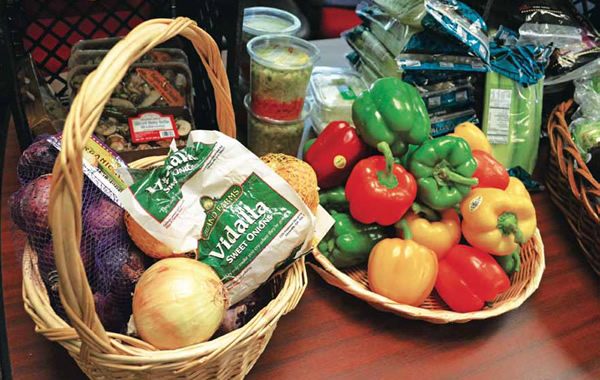Designing Barrington Lifestyles | Barrington Horse Country
Bin There, Do That
Barrington’s youngest learners begin a food journey to last a lifetime

As a mother throws her trash away, her child peeks into the bin and says, “Mom, you can’t throw that milk carton in the garbage. That goes in the recycling.” Surprised at her 10-year-old daughter’s discovery, she takes the carton and tosses it toward the blue bin. “Whoa there’s still a little milk in there. You should drain that in the sink first.” The girl then rummages through the garbage and pulls out an orange rind. “Hey make sure to use these fruit peels as compost!”
This heightened awareness of managing food waste is top of mind for many children at Countryside Elementary School thanks to Mindful Waste’s food recovery program. From February 11 to May 26, students assorted their lunchtime waste into recycling, liquids, and landfill. Anything that the children didn’t eat, whether fresh fruit, or unopened packaged food or drink items was donated to families in need.
The food recovery program is an expansion of Waste Free Wednesdays, one of the first programs implemented by Mindful Waste that encourages students to separate their lunches—choosing between resources and landfill. The U.S. government estimates that 12 percent of our trash is food waste, and when sent to a landfill rather than composted, or consumed, adds to the creation of greenhouse gases.
According to Renee Blue, a co-founder of Mindful Waste, Barrington 220 schools generate approximately 160,000 pounds of food waste per school year. One reason for this statistic is the 20-minute lunch period in elementary schools. And when a few students who wait the longest in the lunch line have seven to nine minutes left to eat or purchase a meal, food can remain untouched.
“We want to stress that we’re not encouraging kids to donate their lunch,” Mindful Waste Co-founder Jennifer Kainz said. “We want them to feed their bellies first, take whatever items they want home, and then donate the leftovers.”
These “leftovers” totaled to 1,929 perishable and non-perishable food items, equaling 752 pounds in the 15 weeks of the program this year.
This amazing accomplishment took the cooperation of various ages from kindergarten to eighth grade. “For the first six weeks, I had to make sure the kids were putting everything in the correct bin,” Kainz said. “And then they finally started to get the routine.”
Not only did the youth develop green habits, but also became excited about their efforts, clapping and cheering as Kainz announced their progress.
The Countryside Green Club, an organization of grade schoolers dedicated to helping the environment, also became a vital aid to the program. Members would attentively watch out for any misplaced food items as students disposed their trash. Strapping on latex gloves, they dug through trash bins searching for that one straw out of place.
After each class finished lunch, the Countryside Green Club took a tally of donations and its weight, as well as measured the temperature of milk cartons before storing them in a refrigerator. Once the inventory data was collected, the donations were sent every Friday to the FISH food pantry in Carpentersville for 12 weeks. Three weeks of goods were also sent to the Cuba Township food pantry in Barrington.
At Cuba Township food pantry, donations from Countryside, Trader Joe’s, and Jewel are organized into specific food categories. Then on market day, volunteers transform an empty board room at the Cuba Township offices into a bountiful grocery space so 80 struggling families can grab what they need. And the food cycle doesn’t stop there. Any leftovers at this point are shipped to the Greencastle nursing home of Barrington, so no food is left behind.
Since the food recovery program is a success, Kainz and Blue hope to transform it into a district-wide program. If all schools show enthusiasm for the environment and practice proper disposing, the district may reach its 25 percent waste reduction mandate by 2020—a major goal of the Healthy and Environmentally Sustainable Schools committee.
Until then, children at Countryside have embraced the rethinking and repurposing of our precious food supply, and can influence other generations—both the generations before theirs, and those to follow—on why reducing food waste matters.
- - - - - -
Ariel Majewski is a returning QB intern and is assisting with the 2016 internship program this summer. She will be a sophomore at the University of Illinois in the fall.
